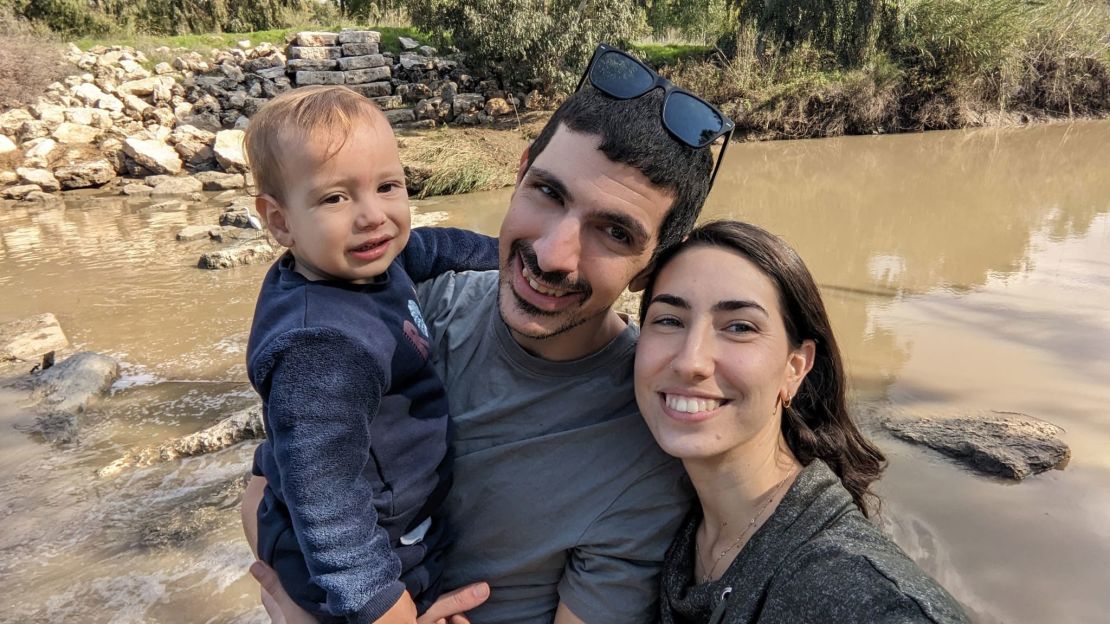Givatayim, Israel
CNN
—
The sight of Or Levy emerging in February from Hamas captivity shocked the world.
The 34-year-old’s pale, emaciated frame stood as a testament to the brutal conditions he endured during the 491 days he was held hostage – almost all of which he spent underground, shackled and hungry.
“It’s hard to understand how difficult it is to live on one pita a day for 491 days … no human should live like that,” Levy said in an interview with CNN this week. “And for the people that are still there, I know those days were even worse than what I’ve been through – and it’s scary.”
Levy has now been home for five months. That time, he says, has been a rollercoaster of emotions, beginning the day he was released, which he describes as both the best and hardest of his life.
He was reunited with his son, Almog, who was just two years old when his father was kidnapped. But he also learned that his wife, Einav, had been killed in the attacks of October 7, 2023 – and had to begin the process of grieving her.
It was the first question Levy asked the Israeli military representative who greeted him as he stepped out of captivity.
“I asked her about my wife. I told her that I think I know, but I’m not 100% certain, and that I want to know,” Levy said. “And then she told me.”
For 491 days, Levy suspected that his wife may have been killed in Hamas’ attack on the bomb shelter from which he was kidnapped, but still held out hope that she may have survived. Most of all, he said he wasn’t prepared to know the truth and did not ask his captors whether she had survived.

Instead, Levy said he stayed alive by focusing on his son – and a mantra that he learned from Hersh Goldberg-Polin, an American-Israeli hostage who would be executed months later by Hamas.
Levy and Goldberg-Polin were taken hostage from the same bomb shelter near the Nova music festival. Seven weeks later, they were reunited in Hamas’s tunnels and spent three days in captivity together.
“I remember Hersh telling me this sentence … ‘He who has a ‘why’ can bear any ‘how’,’” Levy recalled, a quote often attributed to German philosopher Friedrich Nietzsche which the psychiatrist Viktor Frankl referenced in a book about surviving the Holocaust.
Almog was Levy’s “why.”

On difficult days, when Levy said he thought about dying, he would touch his left arm and think about the mantra – and his son.
One of those days was his son’s birthday last year.
With tears in his eyes, Levy recalled spending most of the day crying, quietly singing “Happy Birthday” to his son, telling the other hostages about him and promising that he would do whatever it took to spend Almog’s next birthday together.
Levy was able to keep that promise two weeks ago, celebrating Almog’s fourth birthday at their home in the suburbs of Tel Aviv.
Levy also got the mantra that helped him survive captivity tattooed on his arm – on the same spot he envisioned it while in captivity.
Or’s reunion with his son was nerve-wracking and emotional. He feared that his son might not recognize him. But the moment they embraced all those fears washed away.
“I remember seeing him, hugging him, hearing his voice … crazy,” Levy said.
Levy has now dedicated himself to being Almog’s father, full-time. Increasingly, that has meant answering his son’s questions about the “far place” where he has told his son he was being held and about his mother.
“The story that we told – that he knows – is that a big bomb happened and that unfortunately, mom is dead and I was taken to a far place, and people were trying to get me home,” Levy said. “So he asks – he asks about his mom, about what happened to her, about who caused it? And he asked me about my wounds. He asked me again, why didn’t I take him with me to this far place?”
Levy said he tells his son that his mom didn’t want to leave him, that she loved him from the bottom of her heart. And he tells him stories about her and shows him pictures of her, every day.
As difficult as it is for Levy, who is still grieving his wife’s death, he says he has promised himself that they won’t stop speaking about her.
“Even when it’s hard,” Levy said, “It’s harder for him (to not remember his mother).”
Despite his gratitude for every day he gets with his son, Levy’s ordeal won’t truly be over until all the hostages are home.
“The fact that people are still there haunts me in the night,” Levy said.
Watching the stop-and-start progress of ceasefire negotiations has been “very difficult,” he said – especially knowing that Hamas tends to treat the hostages worse at the times when those negotiations stall or backslide. He recalled Hamas tightening the shackles around his legs in moments when ceasefire talks sputtered.
“Very easily, I could have been still there,” he added.
He could have been in Alon Ohel’s place – the 24-year-old hostage with dreams of studying music, with whom Levy spent most of his captivity and who remains in Gaza.
“I think that nothing is worth more than getting those people home,” Levy said. “I know that we need to push on to get a deal that gets everyone home and finish everything. Finish everything.”




